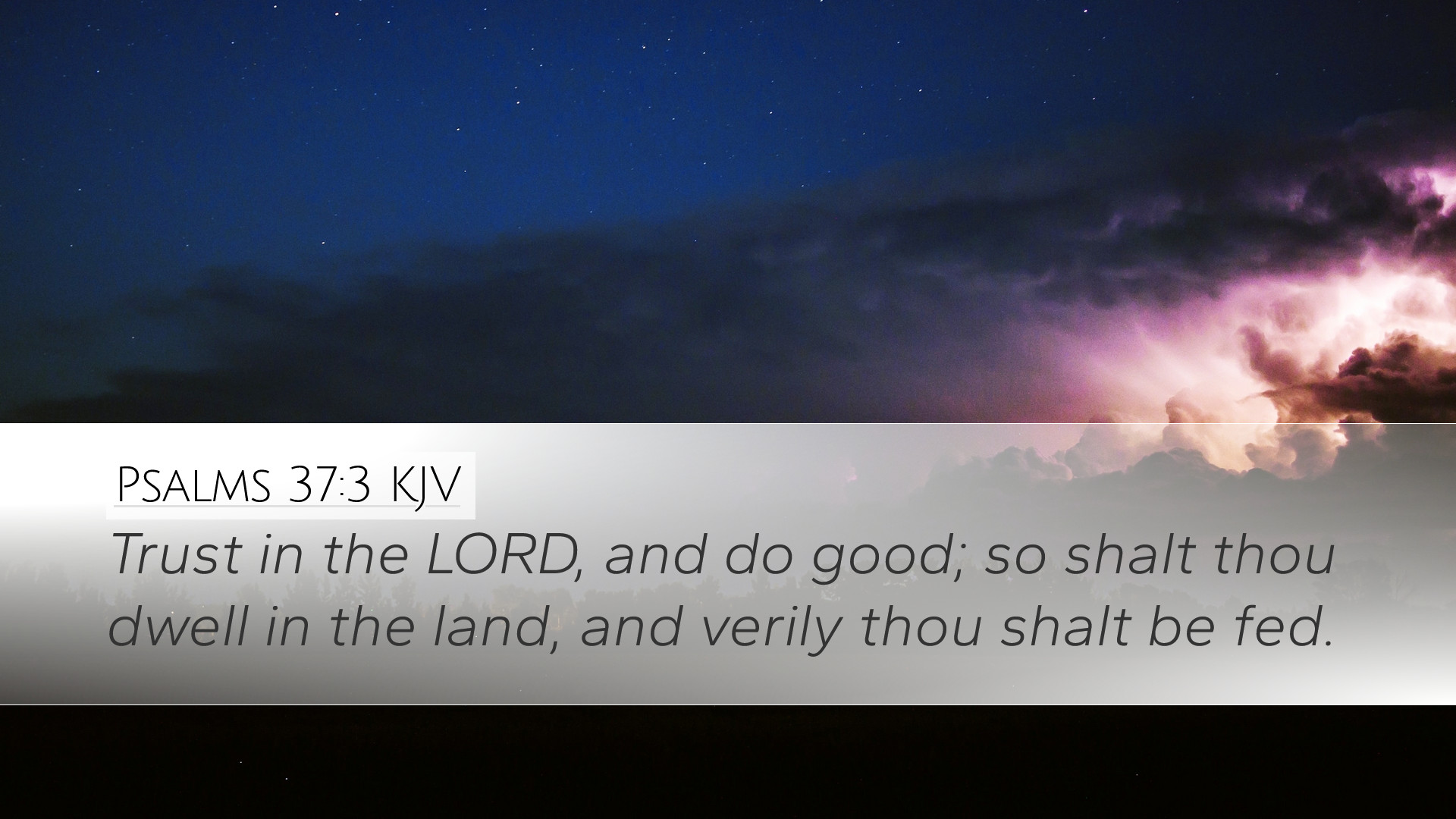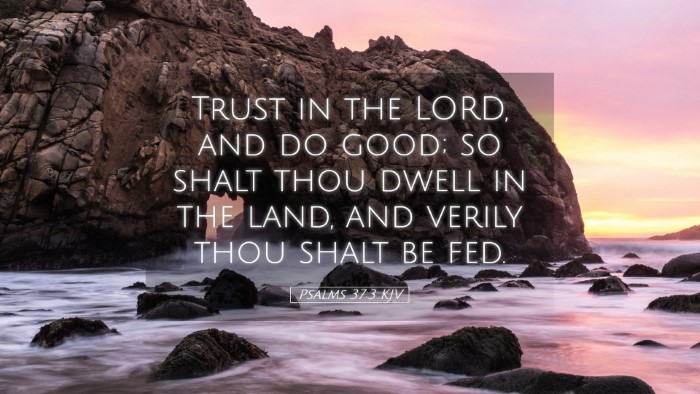Psalms 37:3 Commentary
Verse: "Trust in the Lord, and do good; dwell in the land, and feed on His faithfulness." (Psalms 37:3)
Introduction
The verse Psalm 37:3 encapsulates profound spiritual directives for believers, emphasizing trust in God, the importance of righteous action, and the assurance of divine provision. This commentary synthesizes insights from renowned public domain biblical commentators such as Matthew Henry, Albert Barnes, and Adam Clarke, offering a multifaceted understanding of the text's implications for spirituality and ethical living.
Trust in the Lord
Scriptural Context: The opening phrase "Trust in the Lord" presents an unequivocal call to reliance on God. It serves as both an exhortation and a foundational principle for righteous living.
- Matthew Henry Commentary: Matthew Henry emphasizes that trusting in the Lord is not merely an emotional act but a deliberate choice. He argues that this trust must be coupled with faith that God is sovereign, good, and capable of guiding believers through life's challenges.
- Albert Barnes Commentary: Barnes reflects on the assurance that true trust in God leads to peace and contentment. He notices how trusting God absolves believers from anxiety over sinners prospering while the righteous suffer.
- Adam Clarke Commentary: Clarke highlights the relational aspect of trust, stating that it signifies a belief in God's promise and His character. He encourages believers to see trust as foundational for their conduct and peace.
Do Good
Call to Action: The imperative to "do good" transitions the believer's focus from personal troubles to engaged service in the community. It points to an active expression of faith.
- Matthew Henry's Insight: Henry provides that doing good stems from an understanding of God’s goodness. If God is good and provides, the natural response is to reflect that goodness to others through deeds.
- Albert Barnes' Insight: Barnes interprets "do good" as not only acts of charity but also living righteously. He stresses that engagement in good works is a testament to one’s faith in action.
- Adam Clarke's Perspective: Clarke elaborates that doing good is tied to moral and social obligations. He champions the idea that believers should seek to bless others as a reflection of their trust in God's provision.
Dwell in the Land
The next directive, "dwell in the land," carries connotations of stability, security, and the grace of inhabiting God's blessings.
- Matthew Henry's Commentary: Henry connects this phrase to the idea of enjoying long-term blessings. Dwellers in the land are seen as privy to God’s promises and pleasures when they seek Him.
- Albert Barnes' Commentary: Barnes posits that the "land" represents not just physical territory but also spiritual abundance. He argues that remaining in God's presence allows His blessings to flow.
- Adam Clarke's Insight: Clarke identifies dwelling in the land with a commitment to settle in God’s will. He suggests that this stability is crucial for fruitful living and alignment with divine purposes.
Feed on His Faithfulness
The closing phrase, "feed on His faithfulness," emphasizes the sustenance believers draw from God’s unwavering nature. This metaphorical feeding implies reliance on God's promises as essential for spiritual life and strength.
- Matthew Henry's Explanation: Henry observes that feeding on God's faithfulness portrays dependence upon His continual provision. It invites believers to find nourishment in God’s assurances and commitments.
- Albert Barnes' Reflection: Barnes interprets this feeding as an invitation to trust in God's providence in every circumstance. It suggests that believers should regularly reflect on God's faithful acts as a source of encouragement.
- Adam Clarke's Interpretation: Clarke promotes the idea of actively seeking God's faithfulness in both scripture and personal experience. He encourages believers to cultivate a mindset of gratitude that acknowledges God’s past mercies as the foundation for future trust.
Theological Implications
This verse presents a holistic view of the Christian life, integrating faith with action. It delineates the relationship between trust, ethical obedience, community engagement, and reliance on God's provision. Together, the directives of this verse reflect the kind of life that God desires from His people—one of active faith and moral integrity.
Application for Believers
Pastors, students, and theologians are encouraged to consider how Psalm 37:3 applies to both personal faith and communal dynamics:
- Personal Reflection: Individuals should assess their trust in God and evaluate how it influences their decisions and actions.
- Community Engagement: Churches and ministries should manifest the call to "do good" actively, finding innovative ways to serve the needy and marginalized.
- Spiritual Nourishment: Believers are urged to cultivate practices that remind them of God's faithfulness, such as prayer, scripture reading, and communal worship.
Conclusion
Psalm 37:3 serves as a powerful reminder of the interconnectedness of faith and action. Trust in the Lord, ethical living, and reliance on His faithfulness are vital in the believer's journey. As they navigate life's complexities, these principles guide them toward a fulfilling and productive spiritual life, rooted deeply in the character of the God they serve.


